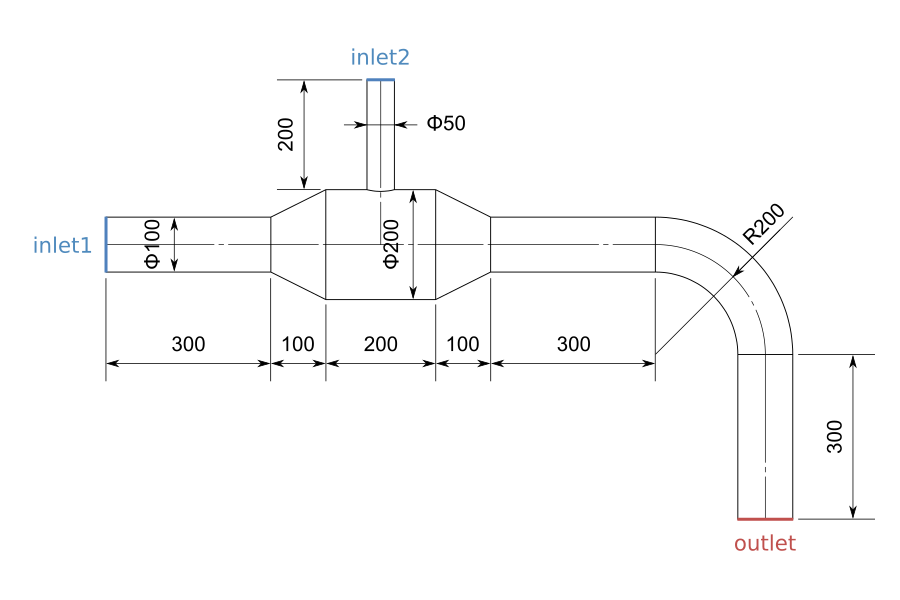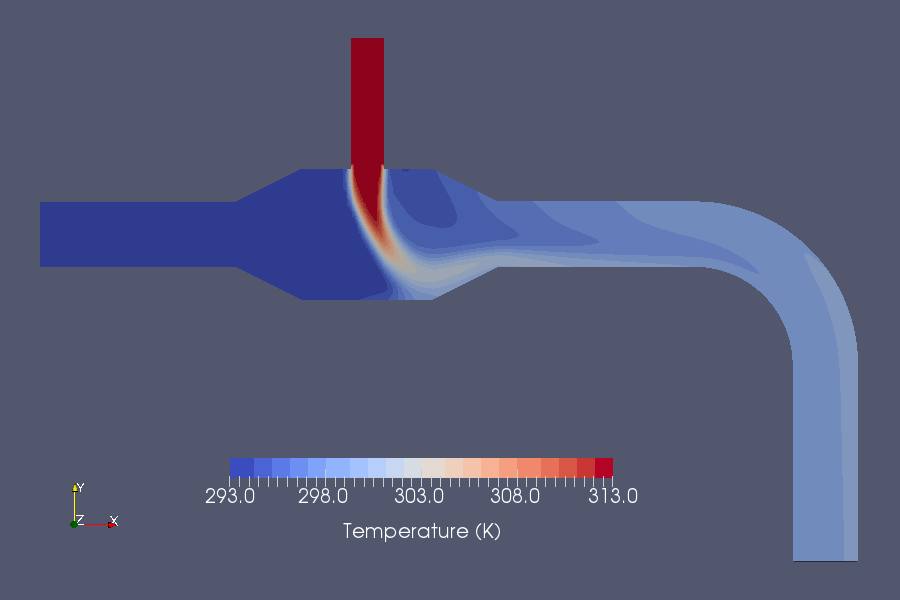はじめに
OpenFOAMによる熱流体解析を紹介します。ここでは、以下のような形状・条件を例題とします。バージョンはOpenFOAM-4.1とし、buoyantBoussinesqSimpleFoamを利用します。
- 形状

- 物性値
- 密度
- 1.0e+3kg/s
- 粘性係数
- 1.0e−3m·s
- 比熱
- 4.2e+3J/(kg·K)
- 熱伝導率
- 0.60W/(m·K)
- 境界条件
- inlet1
- 0.5m/s, 293.0K
- inlet2
- 0.8m/s, 313.0K
作業ディレクトリの作成
最初に作業用ディレクトリを作成します。
- 実行方法
$ mkdir -p $FOAM_RUN/emsco-jp/mixingChamber/{0,constant,system} $ cd $FOAM_RUN/emsco-jp/mixingChamber
メッシュ作成
メッシュ作成は、メッシュ作成事例を参照してください。
重力加速度の設定
強制的に発生させた流れでは、重力の影響を無視できる場合があります。ここでは重力の影響を無視し、重力加速度をゼロに設定します。
- constant/g
FoamFile { version 2.0; format ascii; class uniformDimensionedVectorField; location "constant"; object g; } dimensions [0 1 -2 0 0 0 0]; // [kg m s K kgmol A cd] value (0 0 0);
乱流モデルの設定
標準k-εモデルに設定します。
- constant/turbulenceProperties
FoamFile { version 2.0; format ascii; class dictionary; location "constant"; object turbulenceProperties; } simulationType RAS; RAS { RASModel kEpsilon; // 標準k-εモデル turbulence true; printCoeffs true; }
物性値の設定
OpenFOAMでは非圧縮性流れ解析の場合、粘性係数のかわりに動粘性係数(粘性係数を密度で割った値)を設定します。また、重力を無視する場合は、体積膨張係数と参照温度は結果に影響しないので、適当な値とします。プラントル数(動粘性係数を温度拡散係数で割った値、または、粘性係数に比熱を乗じて熱伝導率で割った値)と乱流プラントル数(0.7~0.9)を設定します。
- constant/transportProperties
FoamFile { version 2.0; format ascii; class dictionary; object transportProperties; } transportModel Newtonian; nu [0 2 -1 0 0 0 0] 1e-6; // 動粘性係数(nu=mu/rho) beta [0 0 0 -1 0 0 0] 0; // 体積膨張係数 TRef [0 0 0 1 0 0 0] 293; // 参照温度 Pr [0 0 0 0 0 0 0] 7; // プラントル数(Pr=nu/alpha=mu*Cp/k) Prt [0 0 0 0 0 0 0] 0.85; // 乱流プラントル数
境界条件と初期条件の設定
流速、圧力、温度、乱流エネルギーおよび乱流散逸率の境界条件と初期条件を設定します。buoundaryFieldに境界条件を設定し、internalFieldに各セルの初期値(以下のファイルでは初期値を一様に与えています)を設定します。また、乱流エネルギーの入口境界条件は乱流強度で設定します。乱流散逸率の入口境界条件は混合長さで指定し、水力直径の0.07倍とします。
- 0/U
FoamFile { version 2.0; format ascii; class volVectorField; location "0"; object U; } dimensions [0 1 -1 0 0 0 0]; // [kg m s K kgmol A cd] internalField uniform (0 0 0); boundaryField { inlet1 { type fixedValue; value uniform (0.5 0 0); } inlet2 { type fixedValue; value uniform (0 -0.8 0); } outlet { type zeroGradient; } wall { type fixedValue; value uniform (0 0 0); } } - 0/p_rgh
FoamFile { version 2.0; format ascii; class volScalarField; object p_rgh; } // 非圧縮性ソルバの場合、圧力は密度で割った単位になる dimensions [0 2 -2 0 0 0 0]; // [kg m s K kgmol A cd] internalField uniform 0; boundaryField { inlet1 { type zeroGradient; } inlet2 { type zeroGradient; } outlet { type fixedValue; value uniform 0; } wall { type zeroGradient; } } - 0/nut
FoamFile { version 2.0; format ascii; class volScalarField; location "0"; object nut; } dimensions [0 2 -1 0 0 0 0]; // [kg m s K kgmol A cd] internalField uniform 0; boundaryField { inlet1 { type calculated; value uniform 0; } inlet2 { type calculated; value uniform 0; } outlet { type calculated; value uniform 0; } wall { type nutkWallFunction; value uniform 0; } } - 0/k
FoamFile { version 2.0; format ascii; class volScalarField; location "0"; object k; } dimensions [0 2 -2 0 0 0 0]; // [kg m s K kgmol A cd] internalField uniform 1; boundaryField { inlet1 { type turbulentIntensityKineticEnergyInlet; intensity 0.05; value uniform 1; } inlet2 { type turbulentIntensityKineticEnergyInlet; intensity 0.05; value uniform 1; } outlet { type zeroGradient; } wall { type kqRWallFunction; value uniform 1; } } - 0/epsilon
FoamFile { version 2.0; format ascii; class volScalarField; location "0"; object epsilon; } dimensions [0 2 -3 0 0 0 0]; // [kg m s K kgmol A cd] internalField uniform 1; boundaryField { inlet1 { type turbulentMixingLengthDissipationRateInlet; mixingLength 0.007; // 0.07 * 0.1(m) value uniform 1; } inlet2 { type turbulentMixingLengthDissipationRateInlet; mixingLength 0.0035; // 0.07 * 0.1(m) value uniform 1; } outlet { type zeroGradient; } wall { type epsilonWallFunction; value uniform 1; } } - 0/T
FoamFile { version 2.0; format ascii; class volScalarField; location "0"; object T; } dimensions [0 0 0 1 0 0 0]; // [kg m s K kgmol A cd] internalField uniform 293; boundaryField { inlet1 { type fixedValue; value uniform 293; } inlet2 { type fixedValue; value uniform 313; } outlet { type zeroGradient; } wall { type zeroGradient; } } - 0/alphat
FoamFile { version 2.0; format ascii; class volScalarField; location "0"; object alphat; } dimensions [0 2 -1 0 0 0 0]; // [kg m s K kgmol A cd] internalField uniform 0; boundaryField { inlet1 { type calculated; value uniform 0; } inlet2 { type calculated; value uniform 0; } outlet { type calculated; value uniform 0; } wall { type alphatJayatillekeWallFunction; Prt 0.85; value uniform 0; } }
離散化スキームの設定
移流項の離散化スキームには、計算安定性の良い一次精度の風上差分法を選択します。
- system/fvSchemes
FoamFile { version 2.0; format ascii; class dictionary; location "system"; object fvSchemes; } ddtSchemes { default steadyState; } gradSchemes { default Gauss linear; } divSchemes { default false; div(phi,U) bounded Gauss upwind; div(phi,T) bounded Gauss upwind; div(phi,k) bounded Gauss upwind; div(phi,epsilon) bounded Gauss upwind; div((nuEff*dev2(T(grad(U))))) Gauss linear; } laplacianSchemes { default Gauss linear corrected; } interpolationSchemes { default linear; } snGradSchemes { default corrected; } wallDist { method meshWave; }
代数方程式ソルバと圧力・速度連成方法の設定
代数方程式ソルバと圧力・速度連成方法を設定します。buoyantBoussinesqSimpleFoamでは、圧力と速度の連成方法としてSIMPLE法が使われています。
- system/fvSolution
FoamFile { version 2.0; format ascii; class dictionary; location "system"; object fvSolution; } solvers { p_rgh { solver PCG; preconditioner DIC; tolerance 1e-8; relTol 0; } U { solver PBiCG; preconditioner DILU; tolerance 1e-6; relTol 0; } "(k|epsilon)" { solver PBiCG; preconditioner DILU; tolerance 1e-6; relTol 0; } T { solver PBiCG; preconditioner DILU; tolerance 1e-6; relTol 0; } } SIMPLE { nNonOrthogonalCorrectors 0; //pRefCell 0; //pRefValue 0; //consistent false; residualControl { //p_rgh 1e-4; //U 1e-4; //"(k|epsilon)" 1e-4 //T 1e-4; } } relaxationFactors { fields { p_rgh 0.3; } equations { U 0.7; "(k|epsilon)" 0.8; T 1; } }
制御パラメータとモニタの設定
計算制御パラメータと残差モニタを設定します。buoyantBoussinesqSimpleFoamなどの定常ソルバでは、通例としてdeltaTを1にして、イテレーション数と時間が一致するようにします。計算終了時間のendTimeは500とします。
- system/controlDict
FoamFile { version 2.0; format ascii; class dictionary; location "system"; object controlDict; } application buoyantBoussinesqSimpleFoam; startFrom latestTime; startTime 0; stopAt endTime; endTime 500; deltaT 1; writeControl timeStep; writeInterval 100; purgeWrite 0; writeFormat ascii; writePrecision 6; writeCompression false; timeFormat general; timePrecision 6; runTimeModifiable true; functions { residuals { type residuals; libs ( "libutilityFunctionObjects.so" ); writeControl timeStep; writeInterval 1; fields ( U k epsilon T p_rgh ); } outletNut { type surfaceRegion; libs ( "libfieldFunctionObjects.so" ); writeControl timeStep; writeInterval 1; log true; writeFields false; regionType patch; name outlet; operation areaAverage; fields ( nut ); } temperatureProbes { type probes; libs ( "libsampling.so" ); writeControl timeStep; writeInterval 1; fields ( T ); probeLocations ( ( .2 0. 0.) ( .5 0. 0.) ( .7 -.2 0.) ( .7 -.5 0.) ); } }
領域分割数の設定
並列計算のために領域分割数を設定します。ここでは並列数は4とします。
- system/decomposeParDict
FoamFile { version 2.0; format ascii; class dictionary; location "system"; object decomposeParDict; } numberOfSubdomains 4; method simple; simpleCoeffs { n (2 2 1); delta 1e-6; }
計算の実行
領域分割してから、計算を実行します。また計算実行中はfoamMonitorを利用して残差などを確認します。
- 実行方法
$ decomposePar $ mpirun -np 4 buoyantBoussinesqSimpleFoam -parallel > log.buoyantBoussinesqSimpleFoam & $ foamMonitor -logscale -refresh 1 postProcessing/residuals/0/residuals.dat & $ foamMonitor -refresh 1 postProcessing/outletNut/0/surfaceReion.dat & $ foamMonitor -refresh 1 postProcessing/temperatureProbes/0/T & $ tailf log.buoyantBoussinesqSimpleFoam
解析結果
計算が完了したらParaViewで結果を確認します。
- 温度コンター


